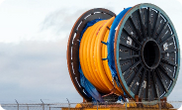All About RS-485 Cable

RS-485 is a standard defining the electrical characteristics of drivers and receivers for use in serial communications systems. The RS-485 cable is designed to support this communication protocol, commonly used in industrial and automation applications for robust, long-distance, multi-device data transmission. RS-485 is still commonly used.
Using a "normal" cable for RS-485 communication is not recommended if reliability and performance are important. RS-485 communication benefits from specialized cables designed for its specific requirements, including noise immunity, signal integrity, and distance capabilities.

Key features of RS-485 cable:
- Twisted pair construction: The cable typically uses twisted pair conductors, which help reduce electromagnetic interference (EMI) and crosstalk between cables.
- Differential signalling: RS-485 uses differential signalling, meaning data is sent over two wires (a positive and a negative line), which enhances noise immunity and allows for longer communication distances (up to 4,000 feet or 1,200 meters).
- Multi-point configuration: RS-485 supports multi-drop configurations, allowing multiple devices (up to 32 devices) to be connected to the same network. This is used for building management systems, industrial automation, and process control networks.
- Data rate and distance: The RS-485 standard allows data rates up to 10 Mbps, but there is a trade-off between data rate and transmission distance.
Applications:
RS-485 cables are widely used in:
- Building automation (e.g., HVAC control systems)
- Industrial machinery communication
- PLC (Programmable Logic Controller) networks
- Remote meter reading
- Security and access control systems
- RS-485 cables are a top choice for fieldbus automation systems like Modbus, BACnet MS/TP, CANopen, and DMX512.
RS-485 vs CAT 6 Cables
Whether RS-485 or Cat6 is better depends on the specific application. RS-485 is optimized for industrial environments where long-distance (up to 1,200 meters), noise-resistant communication is needed for automation, building management, and multi-point control systems. On the other hand, Cat6 is ideal for high-speed Ethernet networks, supporting up to 10 Gbps over shorter distances (up to 100 meters), making it more suitable for home, office, and commercial data transmission. In summary, use RS-485 for robust industrial control and Cat6 for high-speed networking. You do not need to use RS-485 in standard home networks.
RS-485 Wire Configuration
RS-485 can be configured as 2-wire or 4-wire, with the 2-wire configuration being the most popular:
- 2-Wire configuration is most commonly used due to its simplicity and ability to handle half-duplex communication with just two wires (Data+ and Data-). It’s ideal for multi-drop networks where multiple devices share a communication line.
- 4-Wire configuration is used for full-duplex communication, allowing simultaneous transmission and reception with separate pairs for sending and receiving data. It’s more suited for point-to-point or star networks.
- 3-Wire configuration adds a ground wire to enhance signal reliability in noisy environments, typically used in specific scenarios.
RS-485 cables are available at NNC at excellent prices.


















